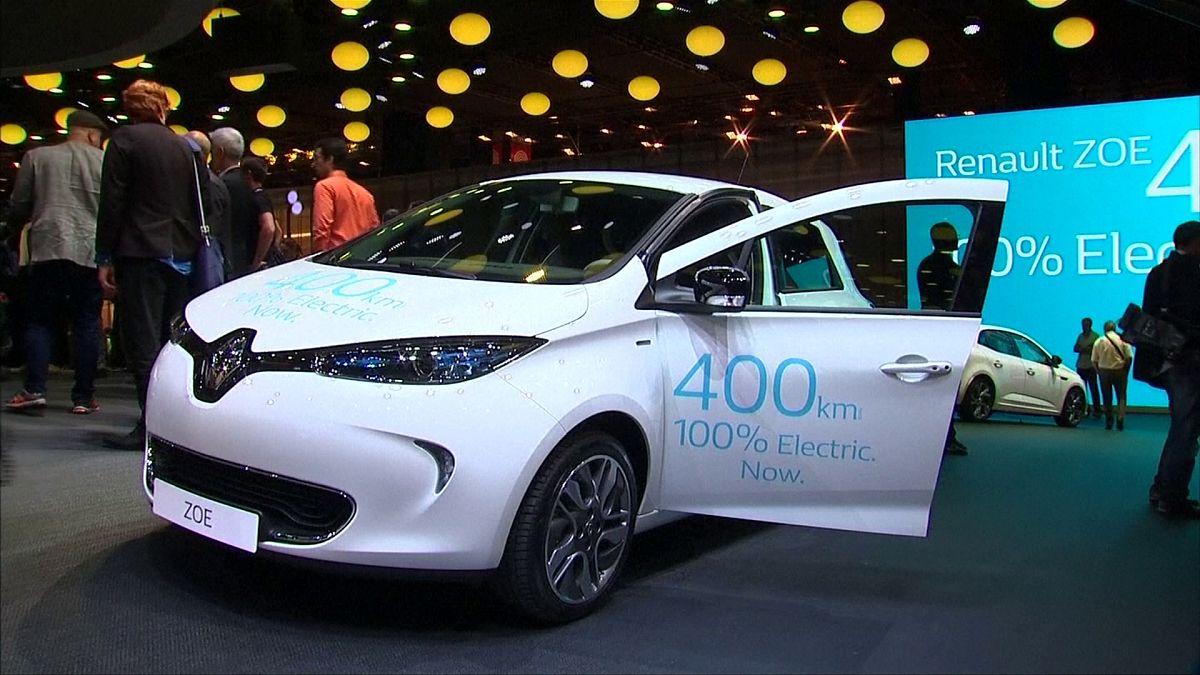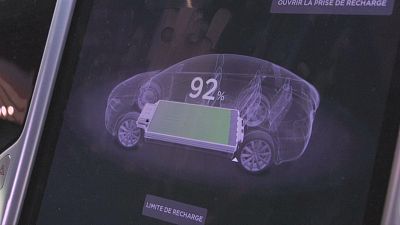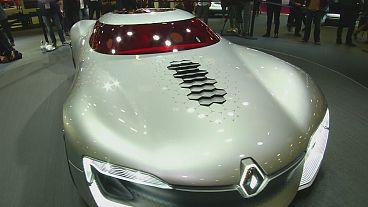The Paris Motor Show is seeing more and more electric vehicles thanks to falling battery costs and reaction to Volkswagen's dieselgate scandal.
Falling battery costs and the fall out from Volkswagen’s diesel pollution test rigging scandal are sparking a revolution on the roads.
At the Paris Motor Show electric car prototypes and plans dominate with carmakers and investors pushing on with plug-in vehicles.
By 2025, we’ll have more than 10 fully electric vehicles on the market. #MondialAutopic.twitter.com/v15SiehBLN
— Daimler AG (@Daimler) September 29, 2016
At the show, Daimler’s boss said that by 2025 as many as a quarter of its new Mercedes and Smarts will be electric”:http://uk.reuters.com/article/us-autoshow-paris-mercedes-digital-idUKKCN11Z1ON?mod=related&channelName=technologyNews.
Toyota revealed it has started to phase out diesel engines and Renault expects them to disappear from most of its European cars because of the cost of meeting tighter emissions standards.
Renault-Nissan’s chief executive Carlos Ghosn said diesel engines will inevitably become more expensive, which rules them out for small cars: “You are going to have to put more technology, you are going to have to put more devices, which means that the cost of the car is going to go higher.”
He said the consequence of that, “is to make diesel less competitive [compared with] other technologies. That’s why we start to see the decrease of the diesel”.
Alex Goy, a senior editor at Carfection.com and Theroadshow.com, explained why electric cars are becoming more popular with drivers: “They’re realising that they’re cheaper to run, sometimes they’re cheaper to buy, as they can be with government grants, and they can be a viable source of transport. And with focus on the environment and the economy, it’s becoming more and more important to brands to actually bring something out that sits in that market.”
The VW I.D. is the first Volkswagen in a completely new fleet of highly innovative electric vehicles. It is… https://t.co/Qhj1RsyX0F
— Sutliff Volkswagen (@sutliffVW) September 28, 2016
For Volkswagen it is a particularly important market as it tries to rebuild its reputation after its exposure last year as a US emissions test cheat, having used special software to make it seem diesel engines were not polluting so much.
Europe’s biggest automobile manufacturer now has plans to roll out 30 electric vehicles in the next few years hoping to achieve annual sales of two to three million electric cars by 2025.
Over one year on from the scandal, Euronews Business reporter Anne Glemarec discussed its consequences with the German carmaker’s Head of Sales and Marketing Jürgen Stackmann, who was at the Paris Motor Show.
Anne Glemarec, Euronews: “Volkswagen’s customers whose cars were fitted with the cheating software in the US, will be offered up to $10,000 (8,900 euros). But VW is refusing to give the same compensation here in Europe. Why?”
Jürgen Stackmann: “We are actually dealing with all of our individual customers in an equal way around the world, trying to give them a technical solution for the update of the car and a very good service experience wherever they live on the planet.
“Obviously we’re not treated legally everywhere the same, so the solution for the US actually looks slightly different. The good news about Europe is that we have already now achieved clarity for 5.6 million cars, in the vehicle parts, on the technical solutions. The customers are called in for an exchange of software and the great news is that our hard work with the authorities here has really paid off.”
Euronews: “Still, the European Commission is pushing for a package similar to the US package. Are you negotiating with Brussels?”
Jürgen Stackmann: “I think I understand the sentiment around this one, but recalls actually are not individually compensated, they are actually repaired, bringing the cars back into shape, as [we have been] ordered [to do], which we are doing with our software.”
Euronews: “In June, Volkswagen’s CEO, Matthias Müller, announced huge investments in electric and self driving cars. When will the first models hit the market and what are your sales targets?”
Jürgen Stackmann: Basically it’s a fascinating time of change and transition of the Volkswagen brand, as a brand VW has made a very early and very rigid commitment to invest in an all-electric platform of cars, so cars that will never see a combustion engine in them. They will only be electric, they have a range of 400 to 600, kilometres so they actually behave like normal cars. We want to bring the car to production in three and a half years, by 2020, at a price actually which is [the same as] a well equipped Golf diesel. We believe that we will be the first company to sell one million electric cars per year, at the latest by 2025.”
Euronews: “Last but not least, what does it mean for the future of diesel engined cars? Do they have a future?”
Jürgen Stackmann: “The answer to that is … yes, we will have basically a parallel move of diesel and petrol cars and we will continue to invest in clean diesel and clean petrol cars for the future. Our duty is to make these technologies as clean as possible, and future proof, and [also to] really focus on electric [vehicle] mobility for the areas of the planet where actually this can happen from an infrastructure point of view.”



